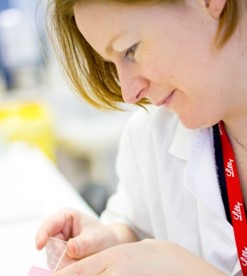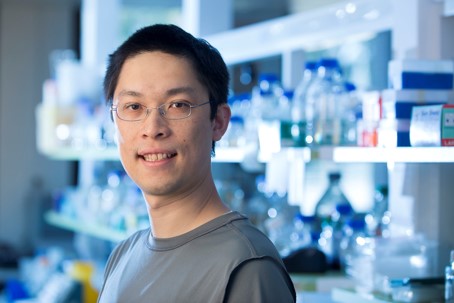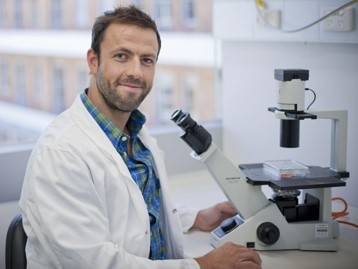VIIN focus on mid-career researchers
20 April 2017
VIIN spoke to four outstanding mid-career researchers from the network about their research and careers.
Dr Michelle Tate, Hudson Institute of Medical Research, awarded a NHMRC CDF commencing in 2017. Michelle’s project is about understanding and modulating hyperinflammation caused by influenza viruses, with a view to identifying and developing new therapies for severe IAV infections.
“In humans, highly pathogenic influenza A virus (IAV) infections can be fatal, as the disease is untreatable with available vaccines or anti-viral drugs,” said Michelle.
“My fellowship aims to advance our knowledge of the mechanisms by which the immune system induces and regulates inflammation during IAV infection, which can be both helpful and detrimental in fighting the infection. This is critical for identifying and developing new therapies for severe IAV infections in the future.”
VIIN asked Michelle: What advice would you give to an ECR at this point in your career?
Many brains are better than one. While it is important to find your niche in research, bouncing ideas off your peers and seeking collaboration will enhance your achievements.

Dr Michelle Tate. Photo credit: Hudson Institute of Medical Research.
A/Prof Sarah Spencer, RMIT, awarded a NHMRC CDF commencing in 2017. Sarah’s project targets central nervous system inflammation to combat obesity-related cognitive dysfunction.
“My findings show obesity can cause inflammation throughout the brain including in regions related to learning and memory,” said Sarah. “I hypothesize that obesity induces long-term changes in the brain’s immune cells, which explains why we see susceptibility to cognitive decline in obese individuals. I aim to reverse these negative effects by targeting these immune cells.”
VIIN asked Sarah: At the conclusion of your fellowship, what key outputs, impacts or translational activities would you like to have achieved?
Our preliminary data are showing that microglia, one of the brain’s major immune cell populations, are very important in the cognitive decline we see in ageing. I hope to be able to show that we can combat this cognitive decline by regulating the activity of these cells.

A/Prof Sarah Spencer. Photo credit: RMIT.
Dr Ivan Poon, La Trobe University, awarded a NHMRC CDF commencing in 2017. Ivan’s project aims to understand the machinery that controls how dying cells decompose and function in influenza A infection.
“In humans, billions of cells will die daily in various organs as part of normal turnover and disease progression,” said Ivan. “During cell death, dying cells can disassemble in to smaller fragments, a process that facilitates their removal and mediates communication with other healthy cells.”
VIIN asked Ivan: Why are you excited about your research?
We don’t really understand how and why cells need to break apart into smaller fragments during cell death. Although this area of research has been overlooked for many years, we have discovered some fascinating processes that will change our understanding of the downstream consequences of cell death.

Dr Ivan Poon. Photo credit: La Trobe University.
Dr Nick Huntington, Walter and Eliza Hall Institute, awarded a NHMRC CDF, commencing in 2017. Nick’s project examines CIS as a potent checkpoint in NK cell-mediated tumour immunity.
“This checkpoint desensitises NK cells to growth factors and switches off their activation and killer function,” said Nick. “When this checkpoint is inhibited, NK cells are super activated and can prevent most types of cancer metastasis in mice.”
VIIN asked Nick: What advice she would to an ECR at this point in your career?
After this CDF I hope to be leading a wider immunotherapy program that encompasses both academic and industry projects on NK cell target identification and drug development. My advice to an ECR at this stage of my career is to really give equal focus to innovation, defining your niche, scientific integrity, translation and professional development. The next stage will involve a big step out of the lab and into the office and you need to be best prepared for this. Don’t be shy in seeking extra management training. It will serve you well.

Dr Nick Huntington. Photo credit: Walter and Eliza Hall Institute.
Current mid-career fellows also include:
NHMRC Career Development Fellows commencing in 2017:
Dr Michelle Tate, Monash University, Understanding and modulating hyperinflammation caused by influenza viruses (RD Wright Biomedical CDF)
A/Pr Andrew Steer, Murdoch Childrens Research Institute, Public health interventions for the control of group A streptococcal disease and scabies in endemic populations (Population Health CDF)
A/Pr Sarah Spencer, RMIT University, Targeting central inflammation to combat obesity and obesity-related cognitive dysfunction (RD Wright Biomedical CDF)
Dr Mandana Nikpour, University of Melbourne, Improving Outcomes in Systemic Autoimmune Disease: a Collaborative and Interdisciplinary Program of Research (Clinical CDF)
Dr Nicholas Huntington, Walter and Eliza Hall Institute, Identification and targeting of a potent NK cell “checkpoint” in tumour immunity (RD Wright Biomedical CDF)
A/Pr Aaron Jex, Walter and Eliza Hall Institute, Systems biology of neglected parasites (RD Wright Biomedical CDF)
Dr Cyril Seillet, Walter and Eliza Hall Institute, Understanding ILC1 transcriptional regulation and function in immune protection (RD Wright Biomedical CDF)
Dr Ivan Poon, La Trobe University, Elucidating the mechanism and function of cell disassembly during apoptosis (RD Wright Biomedical CDF)
Dr Julian Elliott, Monash University, Novel health data systems for translation and impact (Clinical CDF)
NHMRC Career Development Fellows commencing in 2016:
Dr Misty Jenkins, University of Melbourne, Investigating the mechanism and consequences of cytotoxic lymphocyte detachment (RD Wright Biomedical CDF)
Dr Connie Wong, Monash University, Novel strategies to improve stroke outcome (RD Wright Biomedical CDF)
Dr Laura Mackay, University of Melbourne, Molecular Regulation of Tissue-Resident Memory T cell Differentiation (RD Wright Biomedical CDF)
Dr Tracy Heng, Monash University, Overcoming immunosenescence for effective stem cell therapies (RD Wright Biomedical CDF)
Dr Kim Jacobson, Walter and Eliza Hall Institute, Understanding immune memory diversity (RD Wright Biomedical CDF)
Dr Neil Young, University of Melbourne, Genomic-based tools to support the control of urogenital schistosomiasis and hepatic opisthorchiasis (RD Wright Biomedical CDF)
Dr Richard Berry, Monash University, The Structure and Composition of the T-Cell Receptor-CD3 Complex (RD Wright Biomedical CDF)
A/Pr Julie Simpson, University of Melbourne, Integration of biostatistics and mathematical modelling to improve the control of infectious diseases (Population Health CDF)
ARC Future Fellows commencing in 2016:
Alexandra Corbett, University of Melbourne, How the immune system recognises vitamin B-based allergies.
Jerome Le Nours, Monash University, Metabolite- and lipid-based immunity.
Elisa Hill, The University of Melbourne, How the gut nervous system interacts with bacteria.
NHMRC Career Development Fellows commencing in 2015:
Dr Jurgen Bulitta, Monash University, Targeting bacterial ‘superbugs’ by innovative combination dosing strategies and new antibiotics (Industry CDF)
A/Pr Karin Leder, Monash University, Environmental and host contributors to infectious health threats and burden of infectious diseases (Population Health CDF)
Dr Di Yu, Monash University, Immune balance-regulating interleukins as targets for immunotherapy (RD Wright Biomedical CDF)
Dr Tony Velkov, Monash University, The Hunt for New-generation Lipopeptide Antibiotics Targeting Gram-negative ‘Superbugs’ (Industry CDF)
Dr Edwin Hawkins, University of Melbourne, In vivo imaging of protective and malignant B cell function (RD Wright Biomedical CDF)
Dr Catherine Satzke, Murdoch Childrens Research Institute, Impact of pneumococcal vaccination and environmental factors on pneumococcal carriage and disease (RD Wright Biomedical CDF)
Dr Darren Creek, Monash University, Systems pharmacology of antimicrobial drugs (RD Wright Biomedical CDF)
Dr Daniel Gray, Walter and Eliza Hall Institute, The Molecular Determinants of Immunological Tolerance (RD Wright Biomedical CDF)
A/Pr Mark Stoove, Macfarlane Burnet Institute for Medical Research and Public Health, Optimising treatment as prevention strategies for hepatitis C and HIV (Population Health CDF)
ARC Future Fellows commencing in 2015:
Michelle Dunstone, Monash University, Understanding pore formation by the complement Membrane Attack Complex.
NHMRC Career Development Fellows commencing in 2014:
A/Pr Jodie McVernon, University of Melbourne, Ensuring local capability in complex systems methodology to inform infectious disease policy (Population Health CDF)
Dr Kathryn Holt, University of Melbourne, Bacterial population genomics and human disease (RD Wright Biomedical CDF)
Dr Stuart Ralph, University of Melbourne, Understanding whole cell protein trafficking in Plasmodium parasites (RD Wright Biomedical CDF)
Dr Cornelia Landersdorfer, Monash University, Combating bacterial 'superbugs' by innovative antibiotic combination strategies (Industry CDF)
Dr Harin Karunajeewa, Walter and Eliza Hall Institute, Malaria and Infectious Diseases in the Asia-Pacific: Drugs, vaccines and diagnostics (Clinical CDF)
Dr Jacob Baum, Walter and Eliza Hall Institute, The Bionic Parasite: Single molecule through whole cell reconstruction of malaria parasite motility and host-cell invasion (RD Wright Biomedical CDF)
A/Pr Allen Cheng, Monash University, Preventing and treating significant infections in the community and in hospitals (Clinical CDF)
ARC Future Fellows commencing in 2014:
Adam Uldrich, University of Melbourne, Recognition of lipid antigens by the immune system.
Timothy Dempster, University of Melbourne, Environmental and behavioural approaches to parasite resistant aquaculture
Michael Gantier, Monash University, Uncovering microRNA decay regulation in mammalian cells.
Joanne Devlin, University of Melbourne, Alphaherpesvirus vaccination, recombination and latency.

